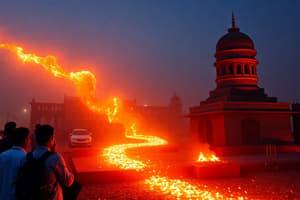Podcast
Questions and Answers
What was India's contribution to world trade in 1992?
What was India's contribution to world trade in 1992?
- 0.53% (correct)
- 2.00%
- 1.25%
- 0.25%
Which of the following was NOT identified as a problem affecting India's economy?
Which of the following was NOT identified as a problem affecting India's economy?
- Low per capita income
- Poverty
- Chronic unemployment
- High technological base (correct)
What was identified as the primary remedy for India's economic issues?
What was identified as the primary remedy for India's economic issues?
- Regulation
- Privatisation
- Liberalisation (correct)
- Globalisation
What status did the US grant to China, emphasizing its role in trade?
What status did the US grant to China, emphasizing its role in trade?
What significant change globally prompted nations to adapt their economies?
What significant change globally prompted nations to adapt their economies?
What was a triggering factor for India's initiative towards liberalisation?
What was a triggering factor for India's initiative towards liberalisation?
Which block has been emerging with a common market philosophy?
Which block has been emerging with a common market philosophy?
Which aspect of change was mentioned as a necessity for businesses in India?
Which aspect of change was mentioned as a necessity for businesses in India?
What factor contributed significantly to India's economic crisis in 1991?
What factor contributed significantly to India's economic crisis in 1991?
Which of the following was a requirement for India to stabilize its economy post-1991?
Which of the following was a requirement for India to stabilize its economy post-1991?
How did India's trade balance perform in 1995-96?
How did India's trade balance perform in 1995-96?
What does the LPG model of development introduced in 1991 emphasize?
What does the LPG model of development introduced in 1991 emphasize?
What was a major consequence of the economic crisis faced by India in 1991?
What was a major consequence of the economic crisis faced by India in 1991?
What was a characteristic of India’s trade deficit since independence?
What was a characteristic of India’s trade deficit since independence?
What was an immediate requirement for India's economy according to the crisis situation?
What was an immediate requirement for India's economy according to the crisis situation?
What was a critical step taken by the government to attract foreign investors?
What was a critical step taken by the government to attract foreign investors?
Flashcards are hidden until you start studying
Study Notes
Liberalisation: Background and Necessity
- India's economic performance in the global market was poor despite vast resources.
- In 1992, India's contribution to world trade was only 0.53%, less than Thailand.
- Despite planned economic growth, India remained underdeveloped with issues like low NNP, chronic unemployment, low per capita income, poverty, and low capital formation.
- Increasing imports led to a trade deficit, foreign debt, low technological base, and a poor external image.
- The government identified liberalisation as a crucial step to address these challenges.
Factors Supporting Liberalisation
-
Global Change:
- The global economy was experiencing rapid change, requiring nations to adapt.
- The European Economic Community (EEC) became the largest single market, showcasing global integration.
- The Gulf War facilitated increased cooperation and integration between the EEC and America.
- The US and Canada formed an integrated trade zone.
- Japan, despite its large trade surplus, remained a strong trading partner for America.
- The US granted "Most Favoured Nation" status to China, signifying a global business philosophy.
- The Asian-Pacific block was emerging, with a common market philosophy gaining ground.
- The success of China's liberalised economy in less than a decade served as an eye-opener.
-
Position of Indian Economy:
- India faced a severe economic crisis and external pressure for foreign exchange.
- The country was on the brink of defaulting in the international arena in 1991.
- This triggered panic among Non-Resident Indians (NRIs), leading to the withdrawal of deposits.
- The country was trapped by internal and external debt.
- The foreign exchange crisis was fuelled by long-term and short-term foreign debts.
- The government needed to attract foreign exchange, increase exports, and reduce imports.
- The country urgently required a modern technology base, greater innovation, capital formation, more employment opportunities, latest technical know-how, and inflow of foreign capital.
- Liberalisation was crucial to attract foreign investors.
-
Trade Deficit:
- India's trade deficit had been a persistent issue since independence.
- India failed to achieve economic independence despite political independence.
- India's share in the world market remained negligible while the import bill increased.
- The trade balance was negative in 1990-91 and became increasingly worse in subsequent years.
- The trade deficit in 1995-96 stood at -3.2% of GDP.
- The trade deficit in 1999-2000 stood at -0.4% of GDP.
- The trade balance was -2.1% and -2.5% in 2002-03 and 2003-04, respectively.
Liberalisation: The Path Forward
- The government needed to release the economy from restricting rules and regulations.
- India needed to establish a new image: a market-oriented economy, private sector-friendly, and a more confident image.
- The government aimed to control both unemployment and inflation.
- Globalisation necessitates liberalisation.
- The LPG (Liberalisation, Privatisation, Globalisation) model of development introduced in 1991 aimed to implement a new strategy with an emphasis on these three pillars.
- Areas previously reserved for the public sector were opened to the private sector.
- The government aimed to transfer loss-making public sector units to the private sector.
Studying That Suits You
Use AI to generate personalized quizzes and flashcards to suit your learning preferences.




